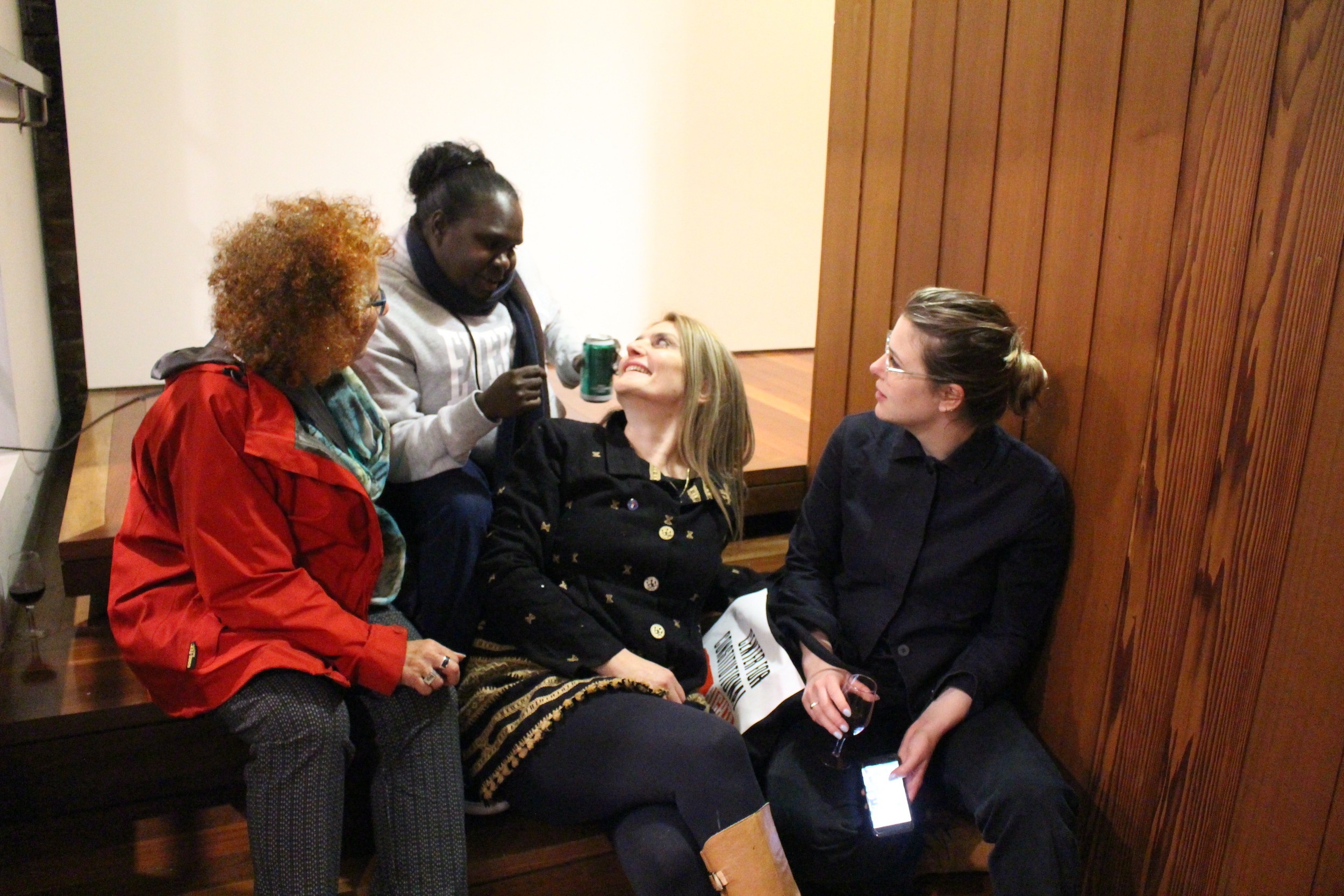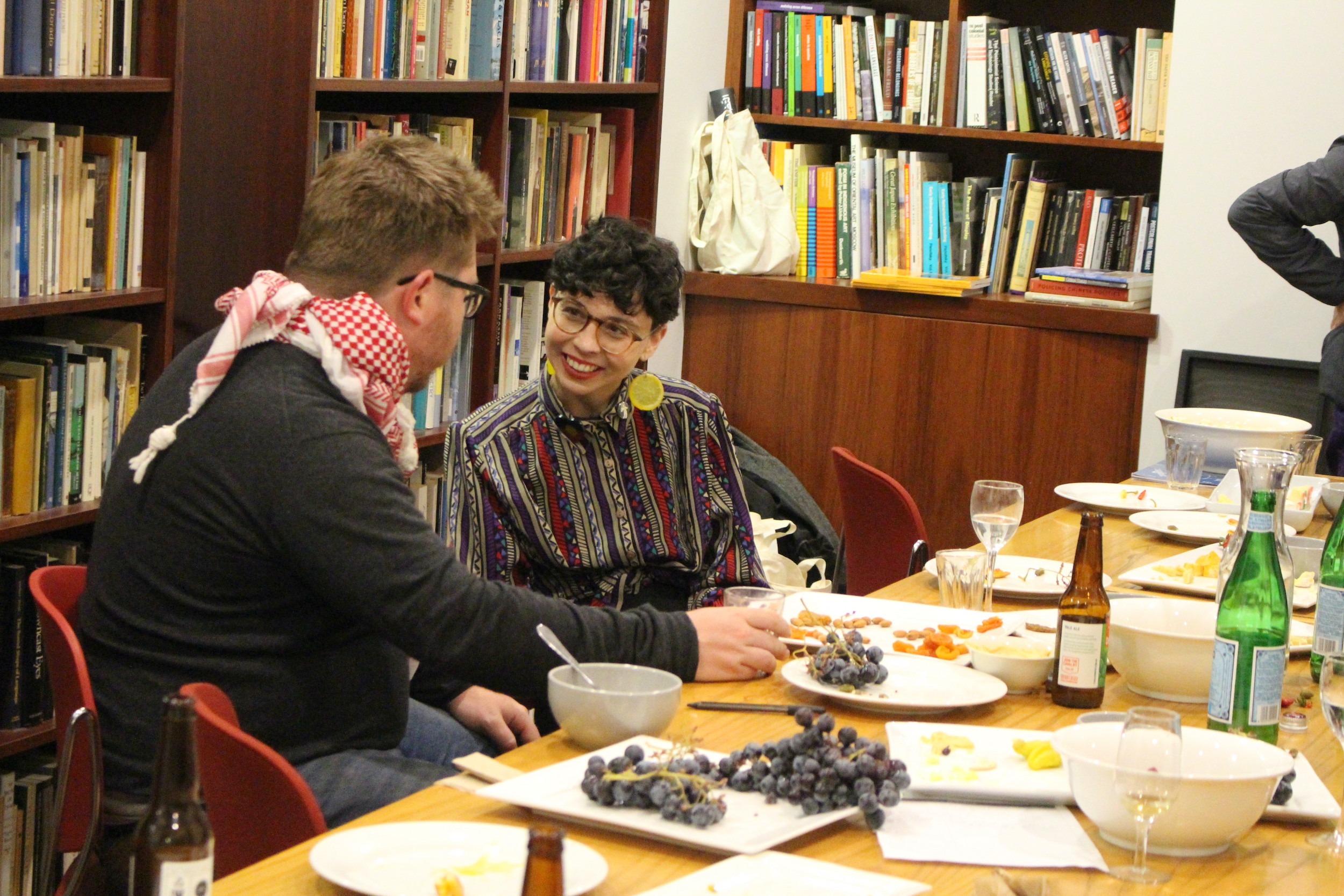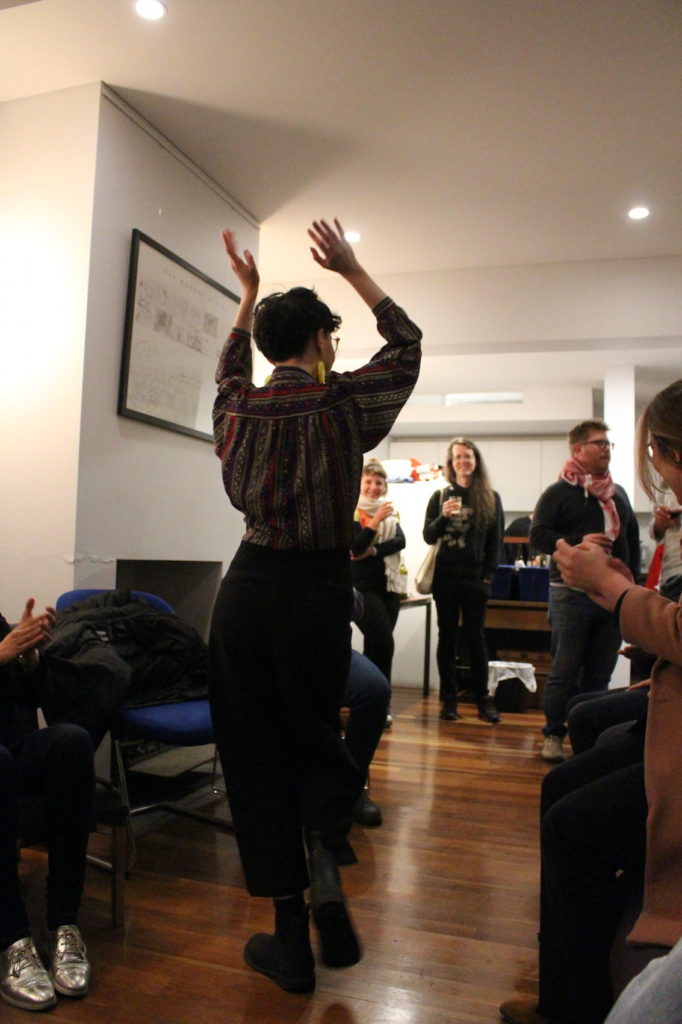
At the Institute of Post-Colonial Studies – 8th November 2019.
Alissar Chidiac, Danielle Bigfoot Lane, Shaenice Moussa, Suzannah Henty
Alissar Chidiac was a part of the Matriarch Panel during the conference, while Danielle Bigfoot Lane was one of the three keynote speakers for the third keynote which was delivered. Shenice Moussa was one of the participants of the BPSC Afterparty and Suzannah Henty was one of the co-convenors of the conference.
In this article, I write about my experience of being a photographer during the celebration of the afterparty of the Black-Palestinian Solidarity Conference and share excerpts of an interview with Suzannah Henty, a co-convenor of the conference.
The Black-Palestinian Solidarity Conference
Between the 6th and 8th November 2019, the Black-Palestinian Solidarity Conference took place in Naarm/Melbourne, on the land of the Wurundjeri people, signalling a confluence of art, ideas and transnational solidarity. The intention of the conference was to delve into the relationship between Aboriginal and Palestinian people in the continent now known as Australia and across the world through the lens of struggle against settler colonialism (The University of Melbourne 2020).
Black-Palestinian solidarity in Australia emerged during the late 1970s through activists Ali Kazak and Gary Foley. Through their respective fights for justice against settler-colonial occupation in Palestine and Australia, Kazak and Foley have both imbued solidarity in their sustained commitment to justice for all. Suzannah Henty writes that the conference is “rooted firmly in the history of solidarity between Aboriginal and Palestinian peoples and remains committed to justice for all” (Foley et al. 2019), and one that aims to reflect on frameworks and interpretations of solidarity and resistance. In contrast to the feelings of fear and anxiety stirred by the pandemic in 2020, the Black-Palestinian Solidarity Conference Afterparty in 2019 was one that evoked jubilation and celebration.
During my interview with Suzannah, she shared that the idea for the conference came after she and Foley travelled to Canberra to see Kazak, a former Palestinian ambassador and head of delegation to Australia, New Zealand and the Pacific region. She described their meeting.
When we met, Kazak and Foley hadn’t seen each other for over twenty years—it was an incredibly moving reunion to witness. Kazak and Foley’s relationship dated back to the late 1970s. Kazak arrived in Australia in 1970 and was shocked to see the dire situation of Indigenous peoples in all dimensions of life under occupation. He soon after became aligned with radical sections of the Black Power movement, of which Foley was closely involved. When we had these lunches over the course of 2018, we did not have the intention of undertaking a project. The decision to pursue a conference on solidarity and resistance Australia emerged from these conversations and a mutual agreement that the time had come to bring together people from across the globe and Australia to discuss the ongoing struggle.
Our tendencies, as humans, to dwell on setbacks and disappointments amplify when a sense of crisis and precarity becomes overwhelming. During precarious times, celebrations not only serve as a form of recognizing our strengths and achievements, they also encourage social solidarity. They invite people to be together, aligning us to universal human experiences of success and sacrifice. While on the journey of advocacy and a seemingly endless fight for justice, celebrations such as the Black-Palestinian Solidarity Conference Afterparty enable us to acknowledge moments of triumph as we totter along the tight-rope of progress and regress.
During the conference, intersections of identity, race, decolonisation, pan cultural movements, appropriated narrative and national myth making were explored. Intersectionality is an analytical framework which was coined in 1989, by Kimberlé Crenshaw. It theorises that the overlap of various social identities such as race, gender, sexuality and class, contribute to the specific type of systemic oppression and discrimination experienced by an individual. Henty highlighted the particular place of intersectionality at the conference.
Emphasising that intersectionality, just as solidarity, is a praxis was a key element to conference. In particular, Foley, Brianna Hoff (who was the coordinating assistant for the conference) and I discussed this for many hours and debated how and in what form representation might be reflected in the conference program. We were and continue to be aware of how the term ‘intersectionality’ is exploited without being practiced. Platforming the work of artists, activists and scholars who explore the question we were addressing in the conference—that is, an anticolonial freedom-based resistance epistemology with solidarity at its core—would not have been a genuine pursuit if we did not reflect this within our team. That said, our team didn’t emerge with this as our motivation, it was reflected from the beginning. There was a genuine feeling that we knew our abilities as well as our deficiencies and that led to the recognition that only together could we succeed in putting the conference together. In terms of the programming, we invited participants to respond to themes that they felt especially pertinent to their research, rather than positioning them within sessions that we felt would work best for us. We didn’t have a ‘Palestinian’ and ‘Aboriginal’ sessions. We opted to avoid any burden of representation and emphasise the logic of occupation and the systems that are created from this logic. By doing so, the layers of oppression within the settler-colonial context that impact LBGTQI+, religious communities, and or the lateral violence that can emerge from biological/cultural constructs of race i.e., anti-Blackness, colourism, Islamophobia and homophobia were understood within the framework of capitalism’s structures of oppression in its imperialist, colonial, neo-colonial, nationalist and neoliberal manifestations.

At the Institute of Post-Colonial Studies – 8th November 2019.
Brianna Hoff served as one of the coordinating assistants during the conference and in this photo, she is seen having a conversation with one of the visitors to the Institute and the BPSC Afterparty.
Taking place over three days, the conference focussed on “transnational solidarity and sovereignty as a means to experiment with and imagine liberatory futures” (Foley & Henty 2020). The conference was fortunate to host the voices of Aboriginal academics such as Professor Larissa Behrednt who spoke about self-determination in film making practice and Professor Irene Watson who spoke about Aboriginal Peoples’ authority and decolonisation. Other topics included the subversion of Aboriginal history in Israeli aspirations to indigeneity presented by Dr Micaela Sahhar and Aboriginal and Palestinian Political Resistance presented by Professor John Maynard, as just a couple of examples from what was a rich plethora of subjects (Black Palestinian Solidary Conference 2019).
Henty recalled that in his closing words at the conference, Foley said that he had been, “waiting forty years for something like this conference to happen”. For Henty, it was an opportunity to enable communities to come together to discuss and share strategies of resistance, further articulate the nuanced logic of colonialism and strengthen alliances that are already existing.
The Black-Palestinian Solidarity Conference Afterparty
I arrived at the Institute of Postcolonial Studies for the after party in the evening to prepare the grounds for the guests making their way from the conference and also in anticipation of those I would meet. These photographs presented in this piece show the celebration of the guests, the organisers of the conference, and several of its speakers and participants. Henty recalled the evening as a relatively casual event that we organised with the Institute of Postcolonial Studies in North Melbourne. There were no formal invitations, participants and attendees of the conference all came together to talk, dance, laugh and just relax.
I distinctly remember feeling a sense of elation seeing a Danielle Bigfoot Lane, a member of the Karrabing Film Collective, talk with one of Foley’s oldest friend Angelo Grando. Grando was in the Student Union at Monash University when Foley and legendary Black Power figure Bruce McGuinness were introduced the Palestinian struggle. This was in 1973 when Zionist students were raising funds for the October 1973 War.
The story goes that Palestinian student Mohammed Ali was being harassed by the Zionist students. McGuinness and Foley intervened, the Zionists turned on them, and other students stepped in to help. During the resulting brawl, McGuinness and Foley managed to rescue the individual under attack and pull him to safety, having only intervened because a group against one person is not a fair fight. It was only afterwards that they found out Ali was Palestinian and that this was the reason he was being harassed.
As a photographer for the afterparty, I had an opportunity to capture moments of interaction between those who were a part of the conference and those who were at the moment. It also prompted me to navigate through questions which emerged such as ‘What is my role in de-normalising oppression in my everyday life?” and “In what ways do our shared histories inform our paths ahead?”, prompting curiosity and thoughts about perspectives on change and cultural translation.
My reflections prompted me to ask Henty if she felt confronted and challenged in her role as a co-convenor of the conference. Henty responded that,
There were many moments throughout the process of convening the conference I was confronted and challenged. To address an issue as politically live as ongoing genocide in settler colonial states, Indigenous resistance, and post-national epistemological aspirations of belonging, this is to be expected.
The most obvious hostility towards the conference came from people who disagreed with aligning Indigenous resistance in so-called Australia and Palestine and our assertion that the Australian and Israeli nation-states are racist apparatuses. The fact that Palestine is a controversial topic continues to astound me. Palestine is occupied by an ethno-religious state that was enabled to obtain already-sovereign land because of British colonialism (the British took control of Palestine at the fall of the Ottoman Empire). The establishment of the United Nations—a neo-Enlightenment project that seeks to establish ‘Western Universalism’ as its standard—further enabled Zionist colonial ambitions that were, from the very beginning of modern political Zionism, designed to ethnically cleanse Palestine of the Indigenous population. Yet somehow, Palestinian statehood and ambitions for self-determination are still radical notions. Somehow, Aboriginal self-determination is too. So, any opposition to us in this sense was relatively inconsequential because are familiar with our opponents.
A practical example of the challenges we faced was when the marketing department of the University expressed unease with the phrase ‘Free Gaza’ on the poster and next to it, the ‘University of Melbourne’ as the location. This was easily fixed—more established and well-situated colleagues in the University assured the marketing that there is nothing problematic about the phrase ‘Free Gaza’ and we wrote ‘hosted at’ the University, rather than ‘hosted by.’ This is the sort of minor diplomatic stuff you have to deal with when using the word ‘Palestine’, ‘Indigenous’, ‘Resistance’ — and that’s important to note in a place like Australia when Indigenous solidarity often is so one-sided, benefitting White consciousness and not enabling any structural dissolution to occur.
Hostilities also came from sponsors who felt that they had ownership over the project and in fact, we had a University retract their funding because they did not agree with how Foley, Kazak and I worked. We shared responsibilities, we all had an equal say and we were aware that people would not respond favourably to us or our project. These sorts of challenges were more difficult for me personally, not having the experience that Foley and Kazak have in organising events like this. When these sorts of issues arose, I was lucky to have Gary and Ali telling me to let it slide like water off a duck’s back.
There was also a Palestinian and Aboriginal advisory board for the conference, and we held meetings to discuss the progress of the conference. During these meetings, members of the advisory board would raise issues and concerns they had with the conference — for example, conflicts within the activist community about certain participants or concerns about the wider community being targeted for being part of the conference. Having the counsel of the advisory board was an integral part of the development of the programme.
Progress and regress
Reflecting on the preceding paragraphs, I am reminded of the following quote from Romanian-born American author Elie Wiesel:
“We must always take sides. Neutrality helps the oppressor, never the victim. Silence encourages the tormentor, never the tormented. The opposite of love is not hate, it’s indifference.”
Wiesel was a Holocaust survivor who fought indifference, intolerance and injustice. While his commitment to peace and atonement stemmed from the sufferings of the Jewish people, his advocacy permeated several other causes including victims of apartheid in South Africa and Cambodian refugees (The Elie Wiesel Foundation for Humanity).
To me, the quote signals the degree of power that is held by both the oppressor and the oppressor. I am urged to reconsider my perception of the notion of power, solidarity and how it shifts with circumstances, adding layers of complexity to its slippery nature. When I asked Henty about what solidarity meant under the circumstances of the conference, she replied,
This is an important question. Obviously, we had to be clear about what we meant by ‘solidarity’ when we decided to use the same title of the conference from an event that was held with our collaborators at Columbia University in 2019. They examined the history of solidarity between the Black community in the US and Palestinians, most popularly demonstrated in Black Power figure Kwame Ture and Ethel Minor publishing of the controversial SNCC newsletter ‘Third World Round Up: The Palestine Problem: Test Your Knowledge’ in 1967.
Obviously, solidarity between Palestinians and Indigenous communities in Australia does not share this history, having started with the relationships between Ali Kazak, Gary Foley, Mohammed Ali and Bruce McGuinness and Eddie Zananiri, for example. More commonly examined transnational alliances include Indigenous communities across the Americas, or the connection between the Black Power resistance in Australia and the Black Panthers in the States. We wanted to focus on both the historical origins of Palestinian and Indigenous resistance in Australia. In this sense, we were interested in positioning the solidarity between Palestinian and Indigenous communities against settler colonialism in Australia within the period of the anticolonial Third World struggle from the late1960s and 1970s, from which Aboriginal resistance in Australia has largely been excluded, as well as examine anticolonial solidarity.
We were inspired by Noura Erakat and Marc Lamont Hill’s assessment that solidarity is both a theory and a praxis, which means that it is constantly refined according to anticolonial principles and against neo-colonial manifestations have a tendency to inconspicuously reappear in any resistance practice. Robin D. G. Kelley spoke about how in any pursuit to articulate solidarity, there are issues that arise—for example, anti-Blackness and Black Islamophobia — having stated optimistically that ‘productive discussions, forums, debates, self-critique, and even new scholarship, reminding us that BPTS (Black Palestinian Transnational Solidarity) — like any solidarity — must be understood as a contingent political project rather than some kind of natural, essential, transhistorical alliance.’ The subtitle of the conference ‘against settler nationalisms’ pointed to this — we were aware and critical of neo-colonial epistemologies in decolonial struggles, and this is why we were cautious of the word ‘decolonial’ and favoured ‘anticolonial’ instead. By doing so, we allowed some of the internal conflicts of the struggle to come to the fore, and in addressing them, reinforce the strength of the ongoing anticolonial movement today and set goals for imagining alternative anticolonial spaces.
Our acute awareness of the delicacy of these questions and our years of commitment to untangling these questions (in Foley and Kazak’s case, a whole lifetime of commitment) and not being afraid of what the answers might be created a really positive and healthy space to debate but also at the end—for example, the afterparty — to just relax and to allow ourselves to enjoy a dance while fighting this ongoing struggle.
I think this is probably summed up best when Ghassan Hage posted a picture on social media, of him dancing with Daphne Yarrowin and a quote by anarchist political activist Emma Goldman,
‘If I can’t dance, I don’t want to be in your revolution.’”
This conference and afterparty was held and organised mostly in and around the lands of the Wurundjeri people in the Eastern Kulin Nation. This reflection was also written on these lands. Sovereignty was never ceded. Always was, always will be Aboriginal land. We acknowledge the Wurundjeri people, and First Nation peoples everywhere, in their ongoing struggle against occupation. We pay respect to Indigenous Elders past and present, everywhere.

At the Institute of Post-Colonial Studies – 8th November 2019.
Brianna Hoff dances to music at the afterparty.
